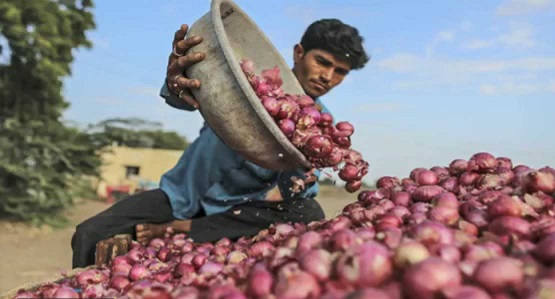India is battling a crisis of onions, which its’ billion-plus citizens can’t do without, threatening a political fallout too grave in nature, and which must rank as one of history’s very poor jokes.
History pulls some poor jokes and I am afraid onion is one of them though it’s unlikely millions of my agitated fellow Indians would view the matter as funny.
Onion prices have hit the roof in India, a kilogram costing one-third of an average Indian’s daily income of $4 dollars, forcing a worried government to seek tranches of supply from Egypt of all places lest the people’s anger extracts a political cost too grave in nature.
There’s a precedent for such grave forebodings too as governments once fell on rising onion costs in Delhi and Rajasthan and Indira Gandhi once channelized such anger to ride to power in 1980 even though the excesses of Emergency were still fresh in people’s mind.
Onion to Indians is what air is to human life, invisible yet impossible to do without, a bulb of a food which launches a thousand curries, an essential even if an inconspicuous item on your food plate, peeling of which is always a teary proposition and consumption of which is strictly no-no if the next thing you are doing is to kiss your lover. You see, what is pungent for your food is odour between two mouths!
Onions were once despised by Indians
Yet history tells us that onion was one of the forbidden foods for ancient Indians who were seeking an austere life. Holy scriptures despised it as aphrodisiac, unsuitable in quest of spiritual life. One of history’s most famous travellers, Hieun Tsang of China, observed in the seventh century that very few locals used onions for fear of being expelled beyond the walls of the town.
Muslim invaders then came in hordes but always returned after loots, unlike the Mughals who dominated the next millennium and barely ate anything without the onions. Their cuisine of rich meat dishes and biryani (flavoured rice), virtually embedded with this layered bulb, sometimes raw, mostly burned brown and mixed, let a strong aroma to the royal kitchenette and their dining halls. The smell soon blew down to the masses beyond the royal walls and before long, onion occupied the pride of place which it retains to this day for an average Indian’s food buds.
The irony won’t be lost to a history student as he observes a renaissance of ancient India and its true ethos of our times which laments the loss of its virility due to a thousand years of servility at the hands of the Muslim invaders and British colonialists and yet is unmindful that one of Indians’ staple food, the unputdownable onions, is actually a gift of the Mughals. That’s what you call out history for one of its poor jokes.
As onion grew in importance, so did its crop for farmers to the extent that India today is the second biggest producer and exporter of onions in the world and earns $360 million each year from its surplus. Once in a while, the monsoon is delayed or rains are active till the onset of winters and this double whammy makes onions scarce and dearer. That’s when fumes of anger hit the power corridors of government and occasionally envelopes it too. This year is a classic case study of such a frightful scenario.
Plans and the battle ahead
India hopes to come to grips with it in a matter of a month or two for there is always an abundance of onions between January and May which allows the excess to be stored and used till August before the fresh crop in winter keeps Indian kitchens running for the rest of the year. It’s this winter crop, called Rabi crop in India, which has suffered the vagaries of weather this year.
Indian government is countering the crisis by banning exports and calling for imports from diverse nations such as Egypt, UAE and Turkey to meet the shortfall. Times were when India turned to Pakistan in such crisis as it was in 2010 but now the ties between the two neighbours is in deep freeze and India even needs permission to use air space of its arch-rivals. There are also measures to subsidize such imports for Indian consumers as well as a policy to ensure Indian farmers don’t get shortchanged in price only because the weather has played truant.
Such assurance though are difficult to extend to its Middle and Far East clients as well as to neighbours like Bangladesh and Sri Lanka who are used to special brown Indian onions and find the alternative, say the white ones from Egypt, too bland in taste. Yet Egypt is now shipping its onions to Sri Lanka which it had done never before. Even the Netherlands is importing onions to Sri Lanka though the transportation lag is no less than six weeks. Onion cost has skyrocketed for India’s traditional export clients and there is fear that India might have yielded too much ground to exporting rivals such as Pakistan, China and Egypt.
(This is a reprint from rt.com).


